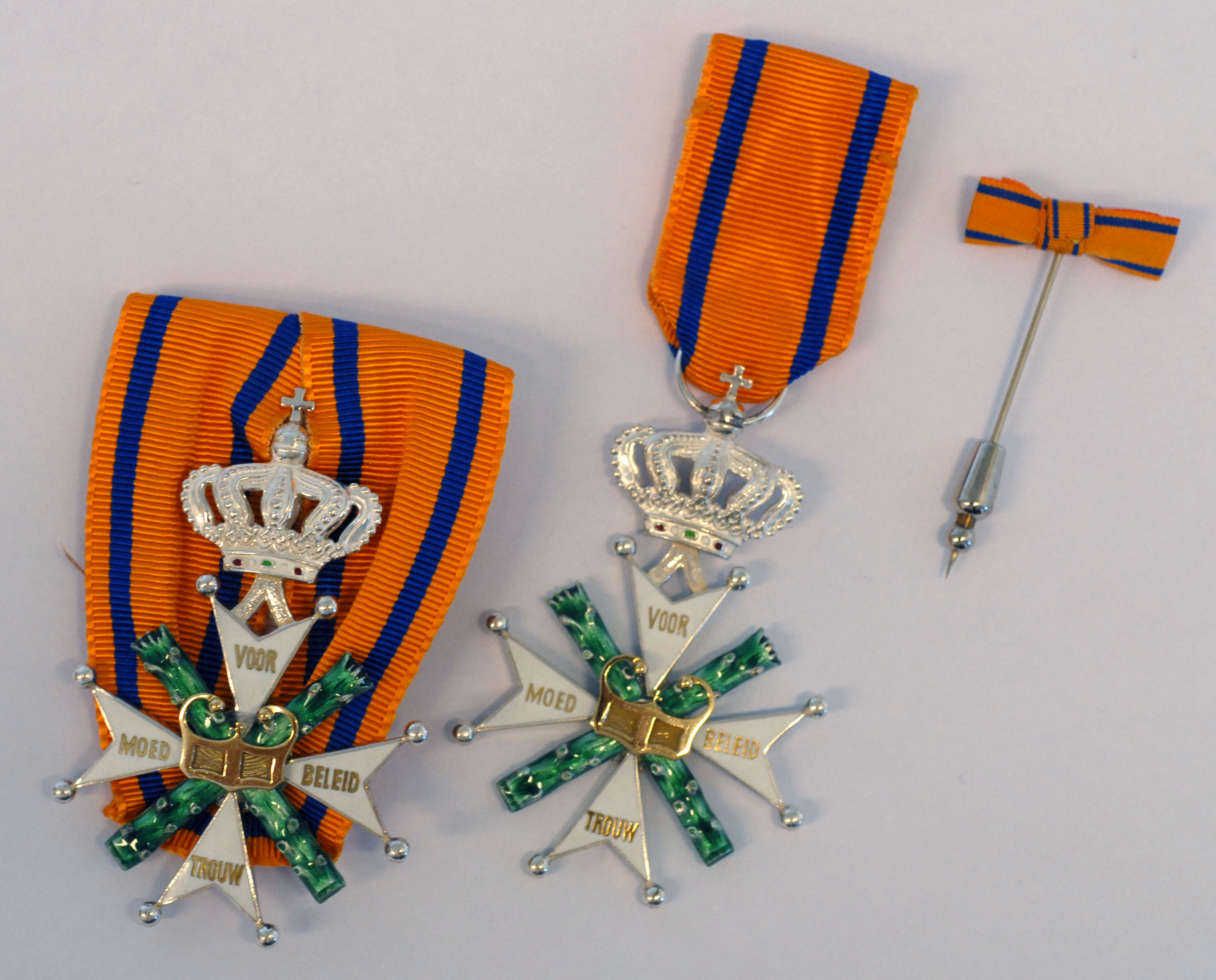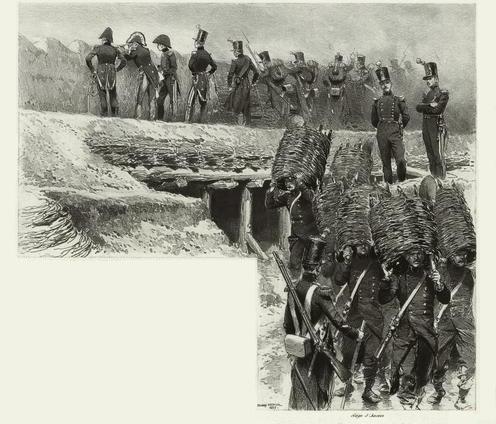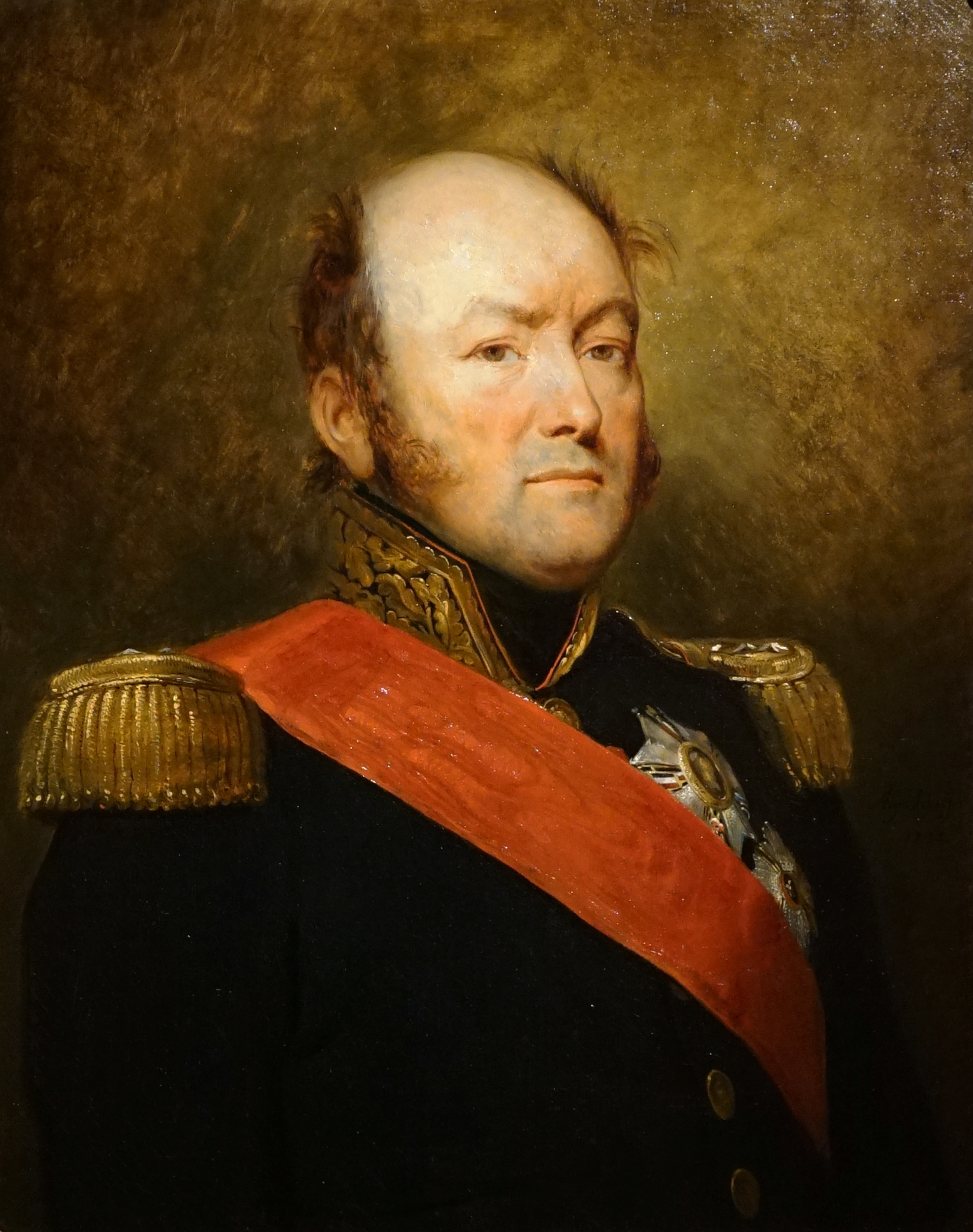|
David Hendrik Chassé
David Hendrik, Baron Chassé (Tiel, 18 March 1765 – Breda, 2 May 1849) was a Dutch soldier who fought both for and against Napoleon. He commanded the Third Netherlands Division that intervened at a crucial moment in the Battle of Waterloo. In 1830 he bombarded the city of Antwerp as commander of Antwerp Citadel during the Belgian Revolution. Biography Family life Chassé was the son of Carel Johan Chassé, a scion of an old Huguenot family, who was a major in the army of the Dutch Republic, and of Maria Johanna Helena Schull. He married Johanna Adriana van Nieuwenhoven on 10 November 1786 and divorced her in 1795. His second marriage was to the English widow Elisabeth Irish on 12 April 1796. They had one son. This marriage also ended in divorce in 1816. Early career Chassé entered the Dutch army as a ten-year-old cadet in his father's regiment in 1775. He was promoted to second lieutenant in 1781. He resigned his commission in 1786 because of his sympathy for the ... [...More Info...] [...Related Items...] OR: [Wikipedia] [Google] [Baidu] |
Jan Willem Pieneman
Jan Willem Pieneman (; 4 November 1779 – 8 April 1853) was a painter from the Northern Netherlands. Biography Jan Willem Pieneman was born on 4 November 1779 in Abcoude in the Dutch Republic (present-day Netherlands). Initially, he worked as a salesman, but also took courses at the Amsterdam '' Stadstekenacademie''.Jan Willem Pieneman in the In 1805 he was appointed as drawing instructor at the artillery and engineering training centre in . He was particularly noted for his paintings depicting events from the history of the |
Peninsular War
The Peninsular War (1807–1814) was the military conflict fought in the Iberian Peninsula by Spain, Portugal, and the United Kingdom against the invading and occupying forces of the First French Empire during the Napoleonic Wars. In Spain, it is considered to overlap with the Spanish War of Independence. The war started when the French and Spanish armies invaded and occupied Portugal in 1807 by transiting through Spain, and it escalated in 1808 after Napoleonic France occupied Spain, which had been its ally. Napoleon Bonaparte forced the abdications of Ferdinand VII and his father Charles IV and then installed his brother Joseph Bonaparte on the Spanish throne and promulgated the Bayonne Constitution. Most Spaniards rejected French rule and fought a bloody war to oust them. The war on the peninsula lasted until the Sixth Coalition defeated Napoleon in 1814, and is regarded as one of the first wars of national liberation. It is also significant for the emergence of larg ... [...More Info...] [...Related Items...] OR: [Wikipedia] [Google] [Baidu] |
Napoleon I Of France
Napoleon Bonaparte ; it, Napoleone Bonaparte, ; co, Napulione Buonaparte. (born Napoleone Buonaparte; 15 August 1769 – 5 May 1821), later known by his regnal name Napoleon I, was a French military commander and political leader who rose to prominence during the French Revolution and led successful campaigns during the Revolutionary Wars. He was the ''de facto'' leader of the French Republic as First Consul from 1799 to 1804, then Emperor of the French from 1804 until 1814 and again in 1815. Napoleon's political and cultural legacy endures to this day, as a highly celebrated and controversial leader. He initiated many liberal reforms that have persisted in society, and is considered one of the greatest military commanders in history. His wars and campaigns are studied by militaries all over the world. Between three and six million civilians and soldiers perished in what became known as the Napoleonic Wars. Napoleon was born on the island of Corsica, not long afte ... [...More Info...] [...Related Items...] OR: [Wikipedia] [Google] [Baidu] |
Military William Order
The Military William Order, or often named Military Order of William (Dutch: , abbreviation: MWO), is the oldest and highest honour of the Kingdom of the Netherlands. It is named after St. William of Gellone (755–814), the first Prince of Orange. Its motto is (For Bravery, Leadership and Loyalty). The chivalric order was established on 30 April 1815 by King William I and was presented for feats of excellent bravery on the battlefield and as a meritorious decoration to senior military officers. Comparable with the French Légion d’Honneur but far less often awarded, it is open to everyone regardless of rank or nobility—not only to Dutch military, but also to foreigners. To date, membership in the Order is extremely rarely awarded, and only for exceptional bravery in battle. In the spring of 1940 it was decided that civilians would receive the Order for heroic acts in the resistance. After the liberation of the Netherlands and the Dutch East Indies, several men and one wom ... [...More Info...] [...Related Items...] OR: [Wikipedia] [Google] [Baidu] |
Siege Of Antwerp (1832)
The siege of Antwerp took place after fighting in the Belgian Revolution ended. On 15 November 1832, the French ''Armée du Nord'' under Marshal Gérard began to lay siege to the Dutch troops there under David Chassé. The siege ended on 23 December 1832. The French had agreed with the Belgian rebels that the latter would not participate in the battle. Following the French army's first intervention in 1831, the Dutch withdrew from Belgium but left a garrison in Antwerp Citadel, from which they bombarded the town. The ''Armée du Nord'' and its siege specialist François, Baron Haxo took 24 days to take this citadel and return it to Belgium. Leopold I of Belgium gave France several cannons of different calibres as thanks for this action and the French Chamber of Peers offered Gérard an ''épée d'honneur'' ("sword of honour"). A monument to the French dead in the siege was sculpted in 1897, but the town of Antwerp refused to take it and it is now in Tournai. Background Whe ... [...More Info...] [...Related Items...] OR: [Wikipedia] [Google] [Baidu] |
Belgian Revolution
The Belgian Revolution (, ) was the conflict which led to the secession of the southern provinces (mainly the former Southern Netherlands) from the United Kingdom of the Netherlands and the establishment of an independent Kingdom of Belgium. The people of the south were mainly Flemings and Walloons. Both peoples were traditionally Roman Catholic as contrasted with Protestant-dominated (Dutch Reformed) people of the north. Many outspoken liberals regarded King William I's rule as despotic. There were high levels of unemployment and industrial unrest among the working classes. On 25 August 1830, riots erupted in Brussels and shops were looted. Theatregoers who had just watched the nationalistic opera ''La muette de Portici'' joined the mob. Uprisings followed elsewhere in the country. Factories were occupied and machinery destroyed. Order was restored briefly after William committed troops to the Southern Provinces but rioting continued and leadership was taken up by radicals, w ... [...More Info...] [...Related Items...] OR: [Wikipedia] [Google] [Baidu] |
Battle Of Waterloo
The Battle of Waterloo was fought on Sunday 18 June 1815, near Waterloo, Belgium, Waterloo (at that time in the United Kingdom of the Netherlands, now in Belgium). A French army under the command of Napoleon was defeated by two of the armies of the Seventh Coalition. One of these was a British-led coalition consisting of units from the United Kingdom of Great Britain and Ireland, United Kingdom, the Netherlands, Kingdom of Hanover, Hanover, Duchy of Brunswick, Brunswick, and Duchy of Nassau, Nassau, under the command of the Duke of Wellington (referred to by many authors as ''the Anglo-allied army'' or ''Wellington's army''). The other was composed of three corps of the Kingdom of Prussia, Prussian army under the command of Field Marshal Gebhard Leberecht von Blücher, von Blücher (the fourth corps of this army fought at the Battle of Wavre on the same day). The battle marked the end of the Napoleonic Wars. The battle was contemporaneously known as the Battle of Mont Saint-J ... [...More Info...] [...Related Items...] OR: [Wikipedia] [Google] [Baidu] |
Hundred Days
The Hundred Days (french: les Cent-Jours ), also known as the War of the Seventh Coalition, marked the period between Napoleon's return from eleven months of exile on the island of Elba to Paris on20 March 1815 and the second restoration of King Louis XVIII on 8 July 1815 (a period of 110 days). This period saw the War of the Seventh Coalition, and includes the Waterloo Campaign, the Neapolitan War as well as several other minor campaigns. The phrase ''les Cent Jours'' (the hundred days) was first used by the prefect of Paris, Gaspard, comte de Chabrol, in his speech welcoming the king back to Paris on 8 July. Napoleon returned while the Congress of Vienna was sitting. On 13March, seven days before Napoleon reached Paris, the powers at the Congress of Vienna declared him an outlaw, and on 25March Austria, Prussia, Russia and the United Kingdom, the four Great Powers and key members of the Seventh Coalition, bound themselves to put 150,000 men each into the field to end ... [...More Info...] [...Related Items...] OR: [Wikipedia] [Google] [Baidu] |
Battle Of Arcis-sur-Aube
The Battle of Arcis-sur-Aube (20–21 March 1814) saw an Imperial French army under Napoleon face a much larger Allied army led by Karl Philipp, Prince of Schwarzenberg during the War of the Sixth Coalition. On the second day of fighting, Emperor Napoleon suddenly realized he was massively outnumbered, and immediately ordered a masked retreat. By the time the Austrian Field Marshal Schwarzenberg realized Napoleon was retreating, most of the French had already disengaged and the Allied pursuit afterwards failed to prevent the remaining French army from safely withdrawing to the north. This was Napoleon's penultimate battle before his abdication and exile to Elba, the last being the Battle of Saint-Dizier. While Napoleon fought against Prussian Field Marshal Gebhard Leberecht von Blücher's Russo-Prussian army to the north, Schwarzenberg's army pushed Marshal Jacques MacDonald's army back toward Paris. After his victory at Reims, Napoleon moved south to threaten Schwarzenb ... [...More Info...] [...Related Items...] OR: [Wikipedia] [Google] [Baidu] |
War Of The Sixth Coalition
In the War of the Sixth Coalition (March 1813 – May 1814), sometimes known in Germany as the Wars of Liberation, a coalition of Austria, Prussia, Russia, Spain, the United Kingdom, Portugal, Sweden, and a number of German States defeated France and drove Napoleon into exile on Elba. After the disastrous French invasion of Russia of 1812 in which they had been forced to support France, Prussia and Austria joined Russia, the United Kingdom, Sweden, and Portugal, and the rebels in Spain who were already at war with France. The War of the Sixth Coalition saw major battles at Lützen, Bautzen, and Dresden. The even larger Battle of Leipzig (also known as the Battle of Nations) was the largest battle in European history before World War I. Ultimately, Napoleon's earlier setbacks in Spain, Portugal and Russia proved to be the seeds of his undoing. With their armies reorganized, the allies drove Napoleon out of Germany in 1813 and invaded France in 1814. The Allies defeated the ... [...More Info...] [...Related Items...] OR: [Wikipedia] [Google] [Baidu] |
Battle Of Maya
The Battle of Maya (25 July 1813) saw an Imperial French corps led by Jean-Baptiste Drouet, Comte d'Erlon attack the British 2nd Division under William Stewart at the Maya Pass in the western Pyrenees. Despite being surprised, the outnumbered British soldiers fought stoutly, inflicting greater losses on the French than they suffered themselves. By the afternoon, the French gained the upper hand and were pressing forward, but the late arrival of a brigade from the British 7th Division stabilized the situation. The British forces slipped away under the cover of night and the French did not pursue effectively. The Peninsular War battle at Maya was part of the Battle of the Pyrenees, which ended in a significant Anglo-Allied victory. Background Arthur Wellesley, Marquess Wellington won a significant victory over the French army of King Joseph Bonaparte and Marshal Jean-Baptiste Jourdan French army at the Battle of Vitoria on 21 June 1813. For the loss of 5,000 men, the Allies ... [...More Info...] [...Related Items...] OR: [Wikipedia] [Google] [Baidu] |




.jpg)




